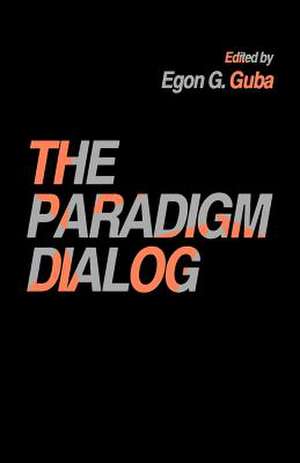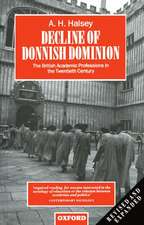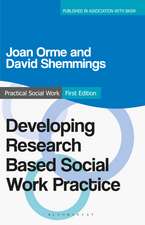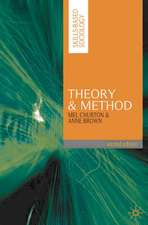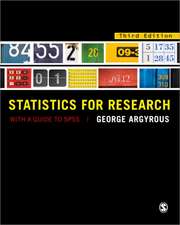The Paradigm Dialog
Editat de Egon Gubaen Limba Engleză Paperback – 28 noi 1990
Preț: 725.71 lei
Preț vechi: 885.01 lei
-18% Nou
Puncte Express: 1089
Preț estimativ în valută:
138.87€ • 145.35$ • 115.58£
138.87€ • 145.35$ • 115.58£
Carte tipărită la comandă
Livrare economică 31 martie-14 aprilie
Preluare comenzi: 021 569.72.76
Specificații
ISBN-13: 9780803938236
ISBN-10: 0803938233
Pagini: 424
Ilustrații: 1, black & white illustrations
Dimensiuni: 141 x 216 x 29 mm
Greutate: 0.54 kg
Ediția:New.
Editura: SAGE Publications
Colecția Sage Publications, Inc
Locul publicării:Thousand Oaks, United States
ISBN-10: 0803938233
Pagini: 424
Ilustrații: 1, black & white illustrations
Dimensiuni: 141 x 216 x 29 mm
Greutate: 0.54 kg
Ediția:New.
Editura: SAGE Publications
Colecția Sage Publications, Inc
Locul publicării:Thousand Oaks, United States
Cuprins
Foreword - Egon G Guba
PART ONE: SETTING THE STAGE
The Alternative Paradigm Dialog
PART TWO: POINTS OF VIEW
Postpositivistic Science - Denis C Phillips
Myths and Realities
Whose Future? Whose Past? Notes on Critical Theory and Methodology - Thomas S Popkewitz
The Making of a Constructivist - Yvonna S Lincoln
A Remembrance of Transformations Past
The Meaning of Alternative Paradigms for Practice - Elliot W Eisner
PART THREE: THE NEED FOR DIALOG: ISSUES AND INTERPRETATIONS
Introduction - Egon G Guba
Accomodation
Accommodation - William A Firestone
Toward a Paradigm-Praxis Dialectic
Social Accomodation - Thomas M Skrtic
Toward a Dialogical Discourse in Educational Inquiry
Discussion on Accommodation - Ann Austin
Ethics
Ethics, Field Studies and the Paradigm Crisis - Louis M Smith
An Ethics of Qualitative Field Studies - Ernest R House
Discussion on Ethics - Thomas Gregory
Goodness Criteria
Alternative Research Paradigms and the Problem of Criteria - John K Smith
Goodness Criteria - Catherine Marshall
Are They Objective Realities or Judgment Calls?
Discussion on Criteria - Lois Heshusius
Implementation
Toward a Dialog about Implementation Within a Conceptual Cycle of Inquiry - Judith L Green and Susanne Chandler
Peering at Paradigms Through the Prism of Practice Improvement - David P Crandall
Discussion on Implementation - Corinne Glesne
Knowledge Accumulation
Three Views on the Nature and Role of Knowledge in Social Science - Jennifer C Greene
Emergent Paradigms. How New? How Necessary? - Margaret D LeCompte
Discussion on Knowledge Accumulation - Judith Preissle Goetz
Methodology
Paths to Inquiry in the Social Disciplines - Thomas R Schwandt
Scientific, Constructivist and Critical Theory Methodologies
Ruminations on Methodology - Gail McCutcheon
Of Truth and Significance
Discussion on Methodology - Marion Lundy Dobbert
Training
So-Called Training in the So-Called Alternative Paradigm - Shulamit Reinharz
A Response to So-Called Training in the So-Called Alternative Paradigm - Jeri R Nowakowski
Reactions to the Dark Half
Discussion on Training - Judy Barford
Values
Reinscribing Otherwise - Patti A Lather
The Play of Values in the Practices of the Human Sciences
Show and Tell - Madeleine Grumet
A Response to the Value Issue in Alternative Paradigms for Inquiry
Discussion on Values - John P Beck
PART FOUR: SUMMATION AND PROJECTION
Introduction - Egon G Guba
A Postnote - Alan Peshkin
Tales from the Rear
Next Steps - Harbans S Bhola
The Auditors' Report
Carrying on the Dialog - Egon G Guba
PART ONE: SETTING THE STAGE
The Alternative Paradigm Dialog
PART TWO: POINTS OF VIEW
Postpositivistic Science - Denis C Phillips
Myths and Realities
Whose Future? Whose Past? Notes on Critical Theory and Methodology - Thomas S Popkewitz
The Making of a Constructivist - Yvonna S Lincoln
A Remembrance of Transformations Past
The Meaning of Alternative Paradigms for Practice - Elliot W Eisner
PART THREE: THE NEED FOR DIALOG: ISSUES AND INTERPRETATIONS
Introduction - Egon G Guba
Accomodation
Accommodation - William A Firestone
Toward a Paradigm-Praxis Dialectic
Social Accomodation - Thomas M Skrtic
Toward a Dialogical Discourse in Educational Inquiry
Discussion on Accommodation - Ann Austin
Ethics
Ethics, Field Studies and the Paradigm Crisis - Louis M Smith
An Ethics of Qualitative Field Studies - Ernest R House
Discussion on Ethics - Thomas Gregory
Goodness Criteria
Alternative Research Paradigms and the Problem of Criteria - John K Smith
Goodness Criteria - Catherine Marshall
Are They Objective Realities or Judgment Calls?
Discussion on Criteria - Lois Heshusius
Implementation
Toward a Dialog about Implementation Within a Conceptual Cycle of Inquiry - Judith L Green and Susanne Chandler
Peering at Paradigms Through the Prism of Practice Improvement - David P Crandall
Discussion on Implementation - Corinne Glesne
Knowledge Accumulation
Three Views on the Nature and Role of Knowledge in Social Science - Jennifer C Greene
Emergent Paradigms. How New? How Necessary? - Margaret D LeCompte
Discussion on Knowledge Accumulation - Judith Preissle Goetz
Methodology
Paths to Inquiry in the Social Disciplines - Thomas R Schwandt
Scientific, Constructivist and Critical Theory Methodologies
Ruminations on Methodology - Gail McCutcheon
Of Truth and Significance
Discussion on Methodology - Marion Lundy Dobbert
Training
So-Called Training in the So-Called Alternative Paradigm - Shulamit Reinharz
A Response to So-Called Training in the So-Called Alternative Paradigm - Jeri R Nowakowski
Reactions to the Dark Half
Discussion on Training - Judy Barford
Values
Reinscribing Otherwise - Patti A Lather
The Play of Values in the Practices of the Human Sciences
Show and Tell - Madeleine Grumet
A Response to the Value Issue in Alternative Paradigms for Inquiry
Discussion on Values - John P Beck
PART FOUR: SUMMATION AND PROJECTION
Introduction - Egon G Guba
A Postnote - Alan Peshkin
Tales from the Rear
Next Steps - Harbans S Bhola
The Auditors' Report
Carrying on the Dialog - Egon G Guba
Descriere
Is scientific positivism, long the reigning paradigm for research in the social sciences, the `best way' to conduct social research? This is the central question examined in The Paradigm Dialog. Recently three key challenges have appeared - positivism, critical theory and constructivism. All three offer researchers new methodological approaches and all three present fundamental questions that must be addressed. Can research be conducted between paradigms? Are they equally useful in answering questions of applied research? What constitutes good or ethical research in each? These and other significant questions are examined by a multidisciplinary group of leading figures in qualitative research.
